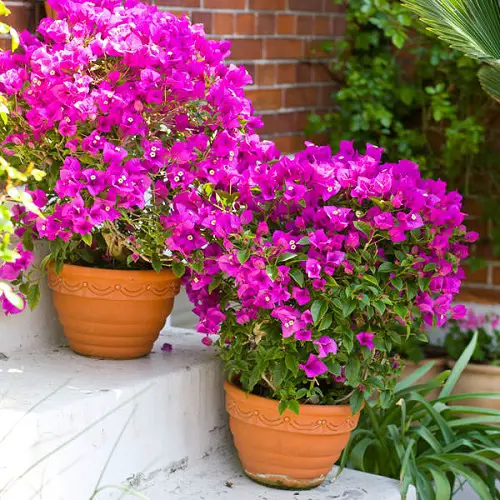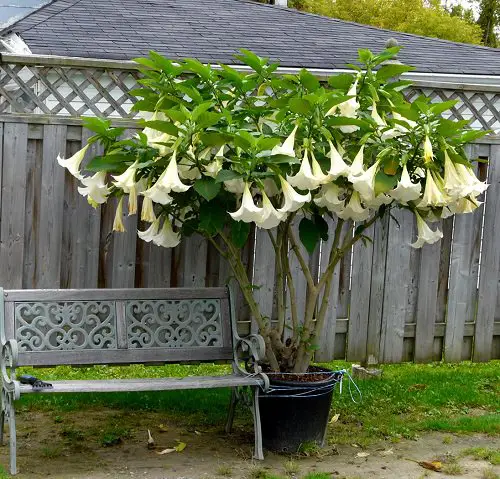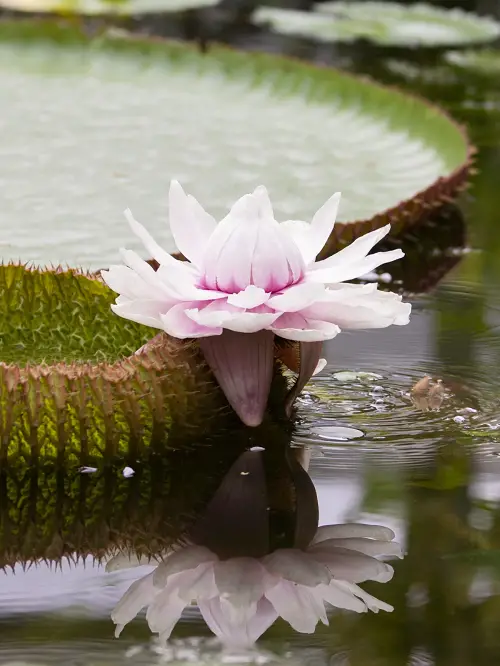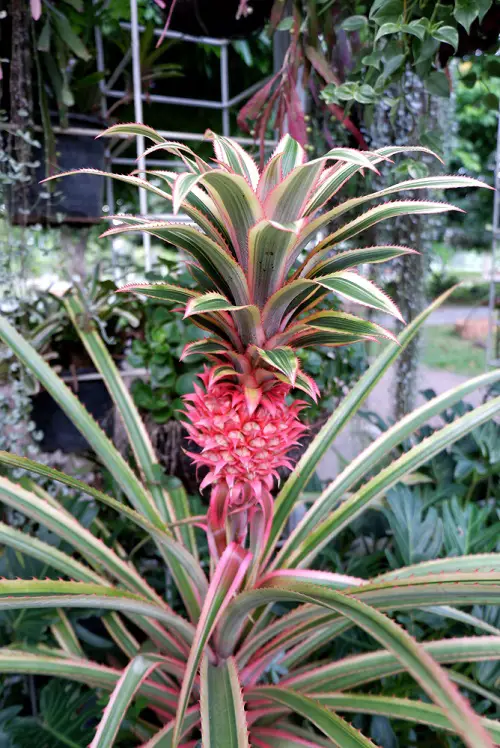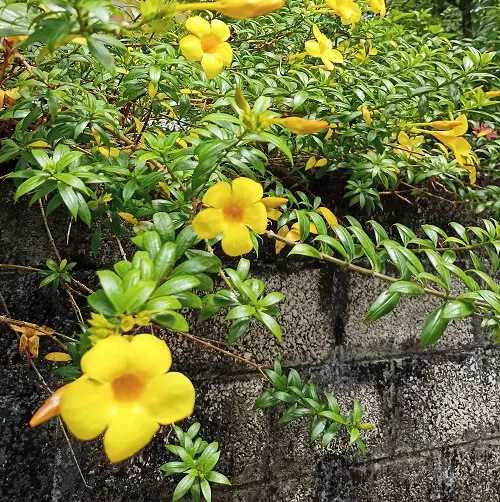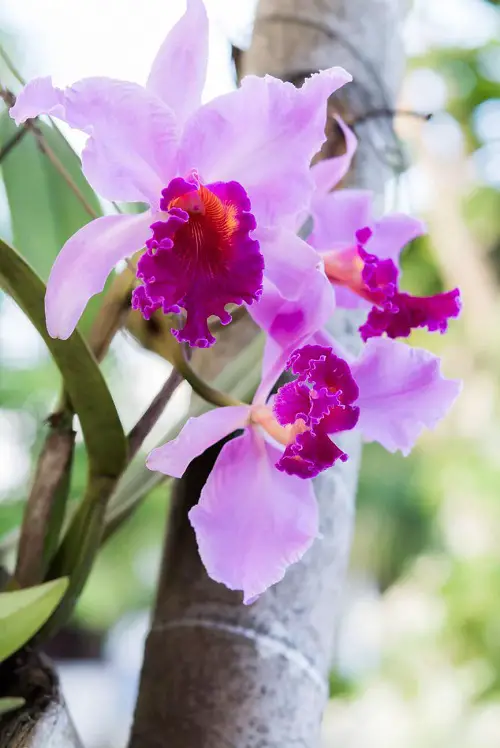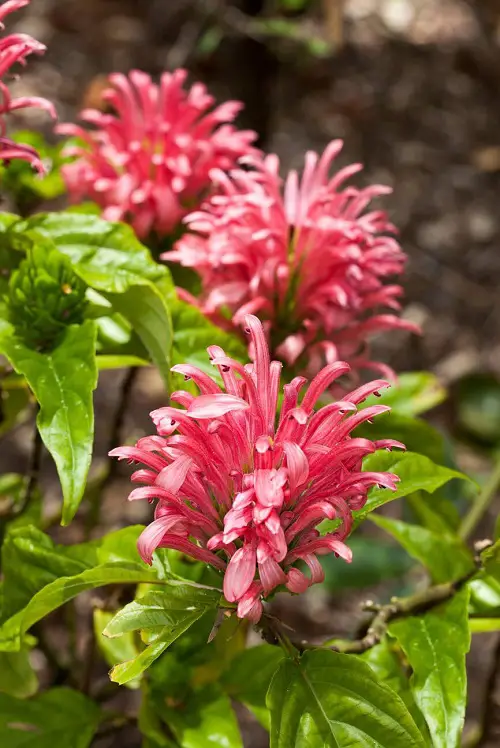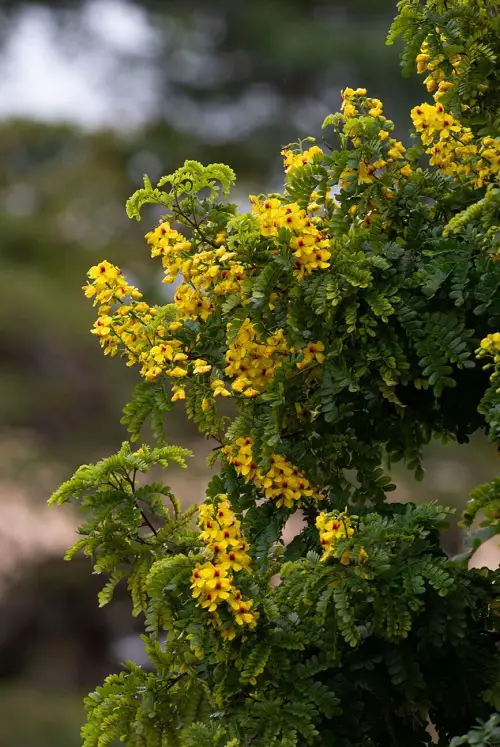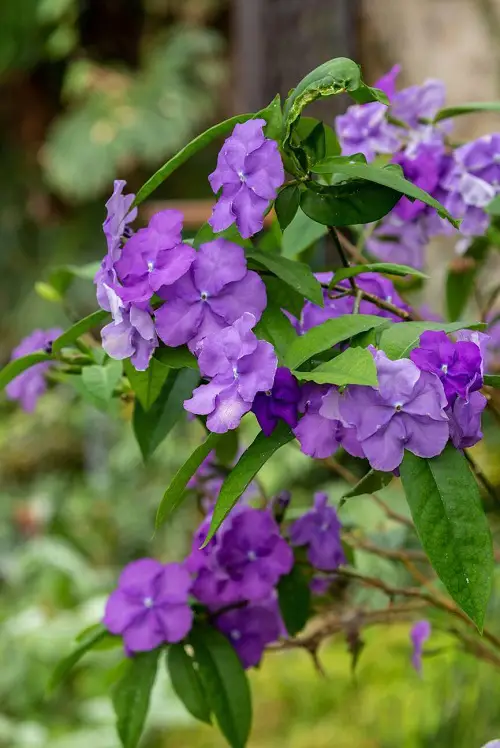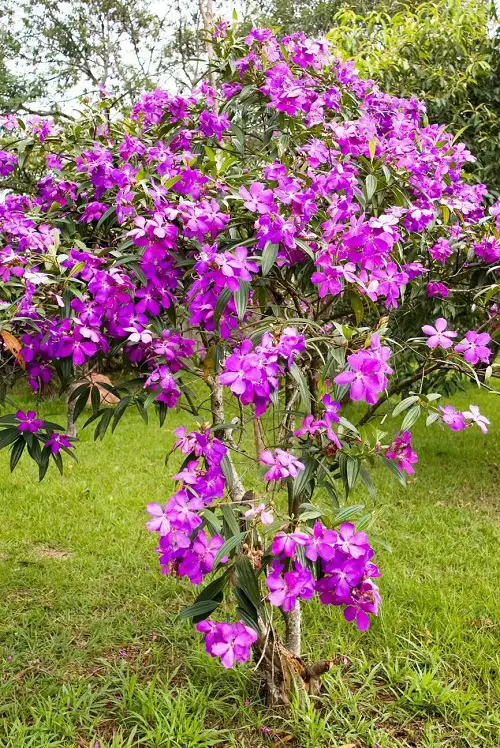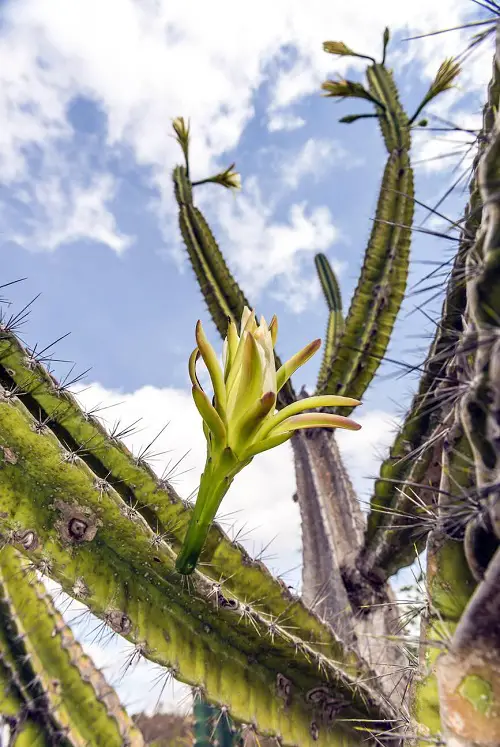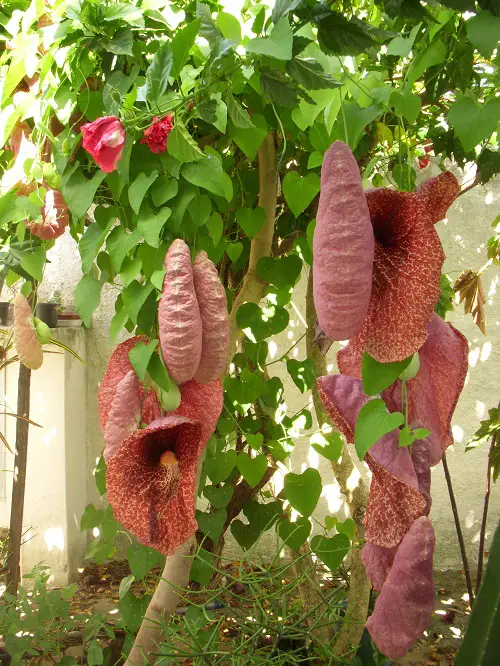Brazilian Flowers offer the right mix of colors and foliage while growing in a warm and humid environment easily!
Brazil’s rich floral diversity, with over 55,000 plant species, offers a plethora of options that you can add to your garden and home. Here are some of the most eye-catching Brazilian flowers you can grow!
Best Brazilian Flowers
1. Brazilian Fuchsia

Botanical Name: Justicia floribunda
Brazilian Fuchsia is an evergreen shrub native to southern Brazil, Paraguay, and Argentina. It is compact in shape, with downy leaves and drooping yellow to scarlet tubular flowers.
2. Flame Vine
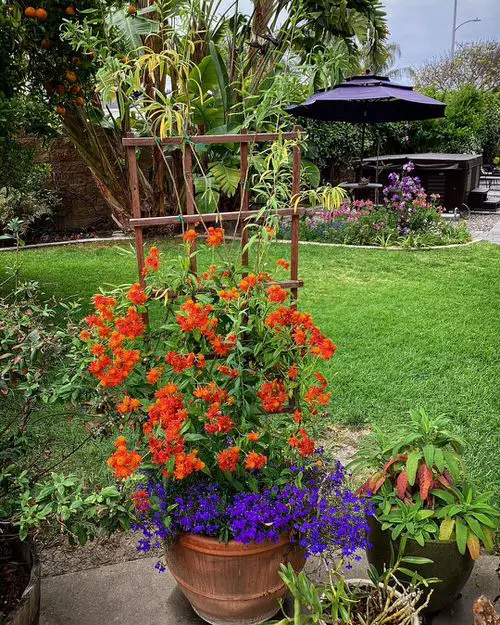 Botanical Name: Pyrostegia venusta
Botanical Name: Pyrostegia venusta
Flame Vine is a creeper that can quickly grow to cover an entire house within just one year. Its bright orange flowers grow together in bunches. Look at the picture! They are a common sight in Brazilian homes.
3. Bougainvillea
Botanical Name: Bougainvillea
Bougainvillea is a vigorous vine popular for its colorful bracts, that come in white, pink, red, orange, or magenta hues. You can easily spot them in arbors, trellises, and balconies in Brazil’s eastern regions.
4. Angel’s Trumpet
Botanical Name: Brugmansia spp.
Angel’s Trumpet is a small tree that produces large flowers. The blooms open at night and come in white, pink, peach, or yellow hues. You must handle the plant with care as all parts are toxic if ingested.
5. Amazonian Water Lily
Botanical Name: Victoria amazonica
The Amazonian Water Lily is native to the Amazon Basin. These Brazilian flowers are known for their size, with leaves that span up to 3 meters in diameter serving as a canopy for the aquatic ecosystem below. The plant also grows pristine white flowers.
6. Bromeliads
Botanical Name: Bromeliaceae
Bromeliads flourish throughout Brazil and come in various shapes and sizes. Some grow on trees, while others spread across the forest floor.
7. Christmas Heliconia
Botanical Name: Heliconia angusta
Christmas Heliconia is native to southeastern Brazil and is known for its red and white blooms during the holiday season. It is also famous as an ornamental plant, and does quite well in hot and humid climates.
8. Morning Glory
Botanical Name: Ipomoea
In Brazilian folk medicine, Morning Glory is popular as salsa-da-praia and is used for its anti-inflammatory and gastrointestinal benefits. This fast-growing vine produces trumpet-shaped flowers that come in a palette of blues, purples, pinks, and whites.
9. Allamanda
Botanical Name: Allamanda cathartica
Allamanda is a sprawling shrub known for its trumpet-shaped flowers and glossy green foliage. Its color can vary depending on the specific variety, ranging from bright yellow to golden yellow or creamy white. It is a common plant across Brazilian landscape.
10. Brazilian Orchid
Botanical Name: Cattleya labiata
The Brazilian Orchid thrives in the northeastern states of Brazil. It usually has white or lavender blooms with a dark spot on the lip. These Brazilian flowers do surprisingly well in open atmosphere, as long as they get dappled light and enough humidity.
11. Flamingo Flower
Botanical Name: Justicia carnea
Also known as the Brazilian plume flower, this plant is common in the Atlantic Forest ecoregion of Brazil. It is widely cultivated for its ornamental value, and features lush green foliage with matching flower spikes.
12. Walker’s Cattleya Orchids
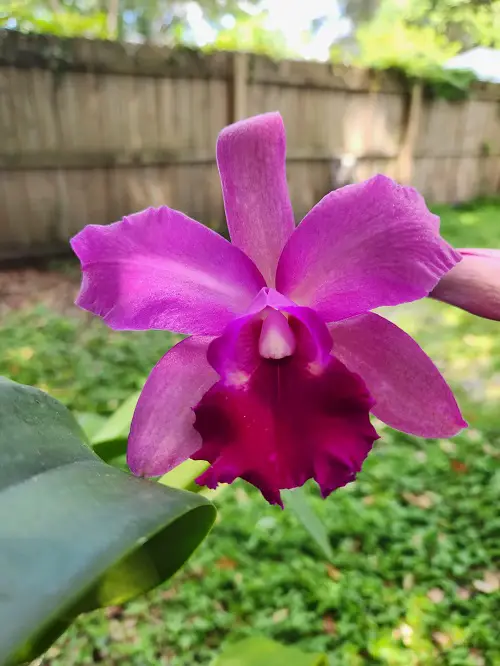
Botanical Name: Cattleya walkeriana
Walker’s Cattleya Orchids are common in Brazilian homes for their fragrant blooms, which range from pure white to deep purple. They thrive in bright, indirect light and require a well-draining growing medium.
13. Brazilwood Tree Flowers
Botanical Name: Paubrasilia echinata
The Brazilwood Tree is endemic to Brazil’s Atlantic Forest. Its yellow flowers with a distinctive blood-red blotch, have a sweet fragrance that attracts a range of wildlife native to Brazil.
14. Yesterday, Today, Tomorrow
Botanical Name: Brunfelsia pauciflora
The Yesterday, Today, Tomorrow plant earns its name from its flowers, which change color over the coming several days. These Brazilian flowers usually start off purple, then fade to lavender, and eventually transition to white.
15. Princess Flower
Botanical Name: Pleroma urvilleanum
This robust evergreen shrub is from Brazil’s rich landscapes. Its dark green, hairy leaves, marked with prominent veins, set the stage for the main attraction—clusters of large, purple flowers!
16. Manacá-da-Serra

Botanical Name: Pleroma mutabile
The Manacá-da-Serra tree is from the Serra do Mar in Brazil and is known for its versatility and floral display. Its flowers, which change colors, make it a favored choice for urban landscaping.
17. Mandacaru
Botanical Name: Cereus jamacaru
It is a resilient cactus native to the arid regions of central and eastern Brazil. Towering up to 15-20 feet, these Brazilian flowers are noted for their night-blooming characteristic, unfolding at dusk and withering by morning.
18. Wax Begonias
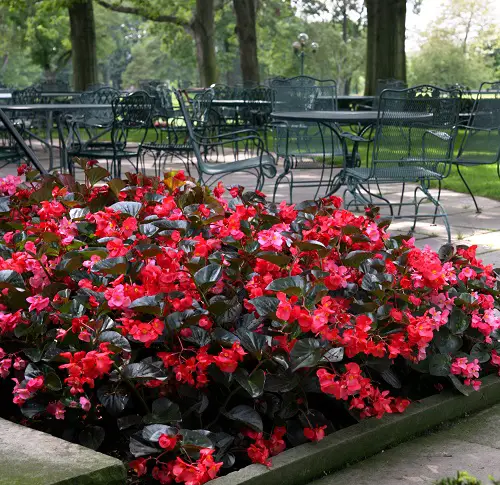
Botanical Name: Begonia semperflorens
Wax Begonias are popular flowering plants known for their waxy, glossy leaves and bright red or scarlet flower clusters. These low-maintenance and easy-to-grow plants are suitable for garden beds, containers, and hanging baskets.
19. Brazilian Dutchman’s Pipe
Botanical Name: Aristolochia gigantea
The Brazilian Dutchman’s Pipe is from El Salvador and other portions of Brazil. It is a climbing vine with unusual flowers shaped like pipes or tubes that come in shades of white, cream, and purple.
20. Firecracker Vine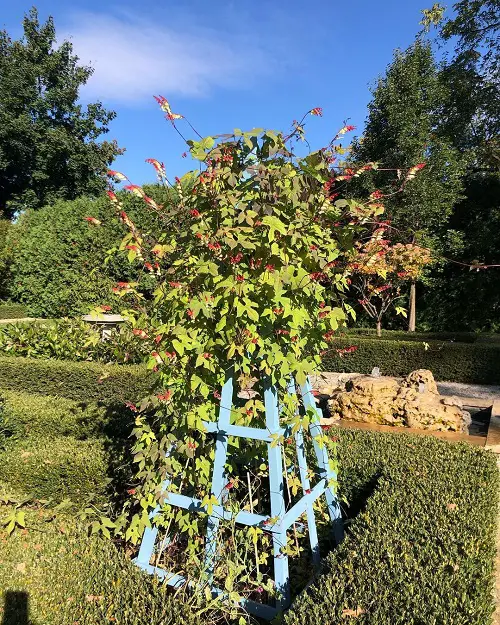
Botanical Name: Ipomoea lobata
The species of flowering plant, also known as the “Spanish flag,” belongs to the Convolvulaceae family and originate from Mexico and Brazil.
These Brazilian flowers bloom in red and gradually fade to shades of yellow, cream, and white, creating a visual effect similar to a firework, earning it the nickname “firecracker vine.”
21. Christmas Cactus
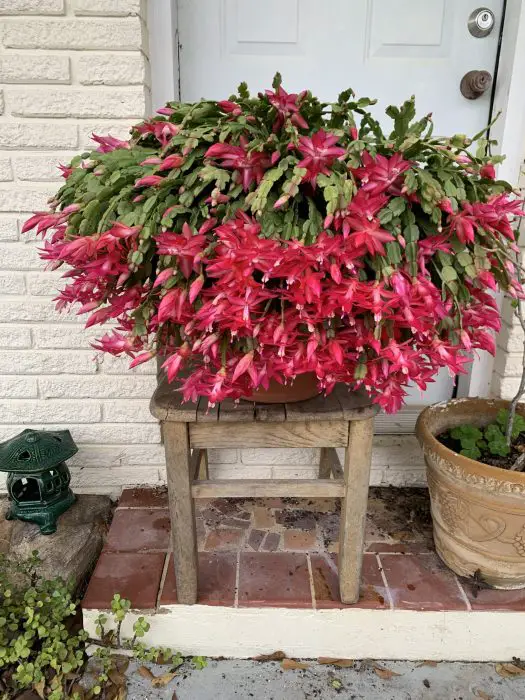
Botanical Name: Schlumbergera bridgesii
This Brazilian native grows naturally in the coastal mountains of southeastern Brazil, and does well in humid environment and dappled light. The plant is a festive time bloomer, and gets covered with stunning flower around the year’s end.


